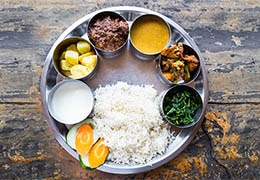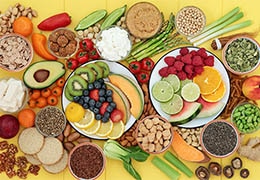To lead a healthy, happy and fulfilling life, your child needs to develop both physically and mentally. While strength and a good immune system will help him deal with physical stress and infections, a well-developed brain will help him think, strategise, solve problems, emote, and care. For his brain to develop properly, you need to provide the right foods, apart from educational toys, books, and puzzles. Here is a list of nutrients that will help boost the brain health of your child.
- Antioxidants:
They protect your toddler’s brain against harmful free radicals and normal injuries in the long run. The best sources of antioxidants are jamun, grapes, red kidney beans, pomegranates, guavas, spinach and beetroot. Spices like cinnamon and turmeric are rich sources as well. Additionally, nuts, seeds, and butters derived from them are great sources of the antioxidant vitamin E, which specifically protects the membranes of brain cells against damages.
Even the classic peanut butter is enriched with omega-3 fatty acids, which is considered a brain-building powerhouse. A couple of easy recipes that work as brain boosting foods for toddlers are peanut butter and jelly sandwich and a smoothie prepared with yoghurt and strawberries or blueberries.
- Choline:
This nutrient very important for the proper functioning of your toddler’s brain because it acts as a precursor for the neurotransmitter acetylcholine. Acetylcholine is a component of phospholipids and plays a major role in the development of cell membranes, and can also be converted into the methyl donor betaine. During pregnancy, it plays an important role in brain structure development as it has a major influence on stem cell proliferation and apoptosis. Though it can be manufactured in the body, the quantity is not sufficient, and so, including food sources rich in choline in your child’s diet is necessary.
Some of the rich sources of choline are foods like eggs (egg yolk), beans, broccoli, sprouts, yoghurt, and cauliflower. Some easy to prepare recipes having high choline content are scrambled eggs, pancakes made with sprouts, and stir-fried broccoli or cauliflower.
- Omega-3 fatty acids:
Mostly found in breast milk and formula milk, these are considered as healthy fatty acids. These are very important for the proper development of the brain and eyes. If your toddler is not drinking either of these, some of the other good sources of omega-3 fatty acids are eggs, yoghurt, walnuts, flaxseeds, rawas, and shrimp.
If you are looking for simple recipes that include omega-3 fatty acids, try to prepare fish fingers with rawas, or add dried berries and walnuts to whole-grain cereals.
- Complex carbohydrates:
These are essential for the brain to function properly. Complex carbohydrates are broken down into glucose after the body absorbs them. This glucose is the main source of energy for the body too. The fibre present in the complex carbohydrates regulates the body’s energy absorption and ensures that the brain gets a slow and steady supply of adequate energy.
Some of the food items containing complex carbohydrates are whole-grain breads, cereals like oats, wheat pasta, and brown or red rice. You can prepare some simple meals like a bowl of cereal or sandwiches made of whole wheat bread. Rotis made of whole wheat or lentil soups are also a good idea.
- Iodine: This is a very critical nutrient for brain development in children. Iodine deficiency in the body can lead to some serious consequences like mental retardation too. Iodine plays a primary role in the synthesis of thyroid hormones, which influences cell metabolism. Iodised salt, cheese, and fishes like shrimp, rohu and ahi are rich in iodine.
- Iron: The deficiency of iron can lead to anaemia in babies, and in older children, it can cause attention problems too. Iron is readily available in green leafy vegetables, beans, tofu, fortified cereals, meat, seafood and poultry.
- Vitamins: Deficiency of Vitamin B12 might result in severe brain atrophy with retarded myelination. In this condition, the frontal and temporal lobes are most severely affected. Vitamin D, not only helps in calcium regulation, but D3 also plays an important role in brain development. Foods like eggs, milk products, fish and meat are rich in vitamin B12, while cheese, egg yolks and fatty fishes contain vitamin D.
- Folic acid: It is one of the most vital nutrients for brain development as it affects nucleotide synthesis, DNA integrity, and transcription. This is the reason why it is very important for pregnant women to take folic acid supplements.
All in all, a variety of nutrients contribute to the brain development of your toddler. So, try and provide him with balanced meals that include items from all major food groups. You can also consult a paediatrician or nutritionist to chart customised meals plans for your little one.
To learn more about Happy Growth and growing up milk visit https://www.nestle.in/brands/nestle-lactogrow
To learn more about growth and possibilities for your child visit www.nangrow.in












